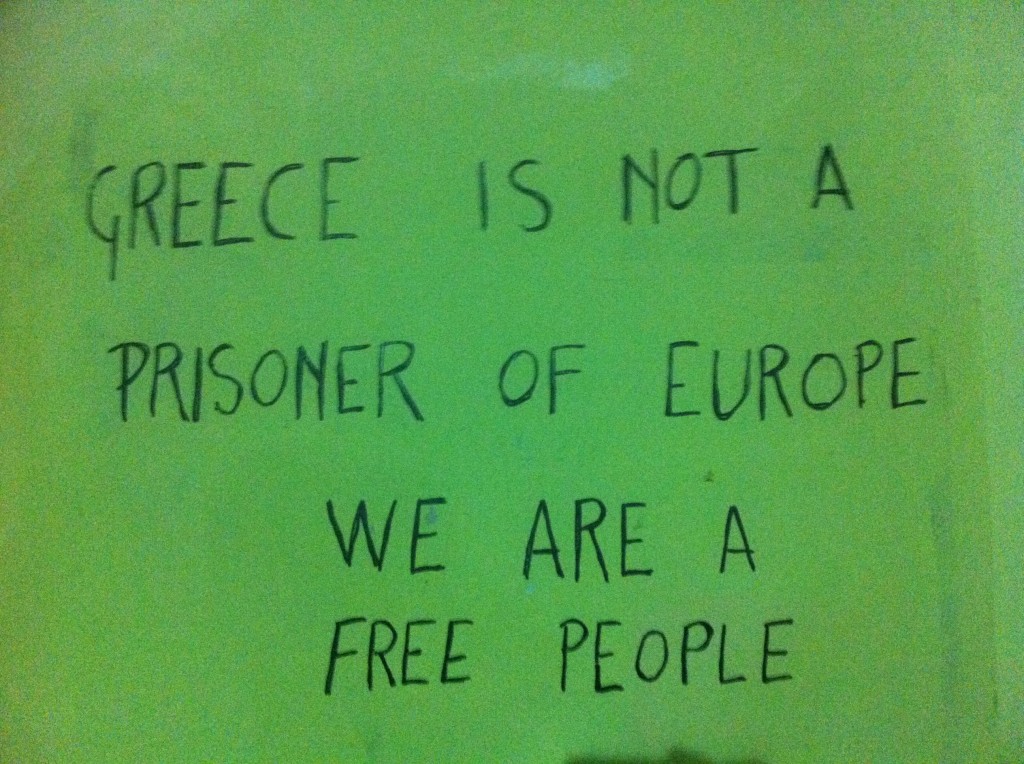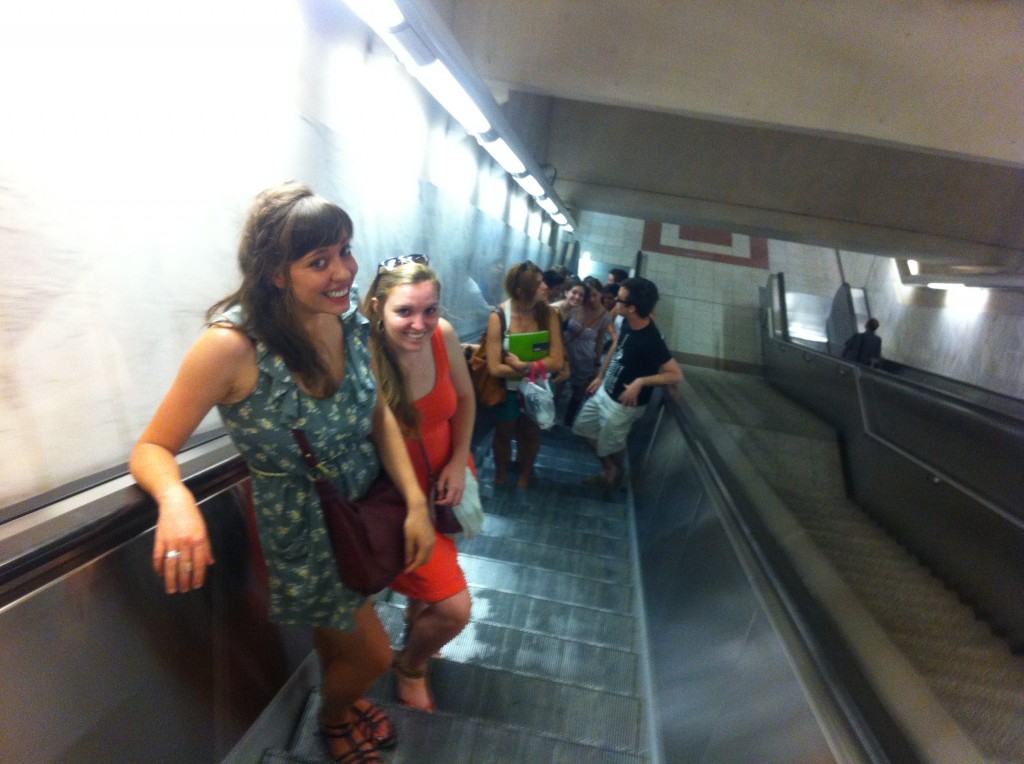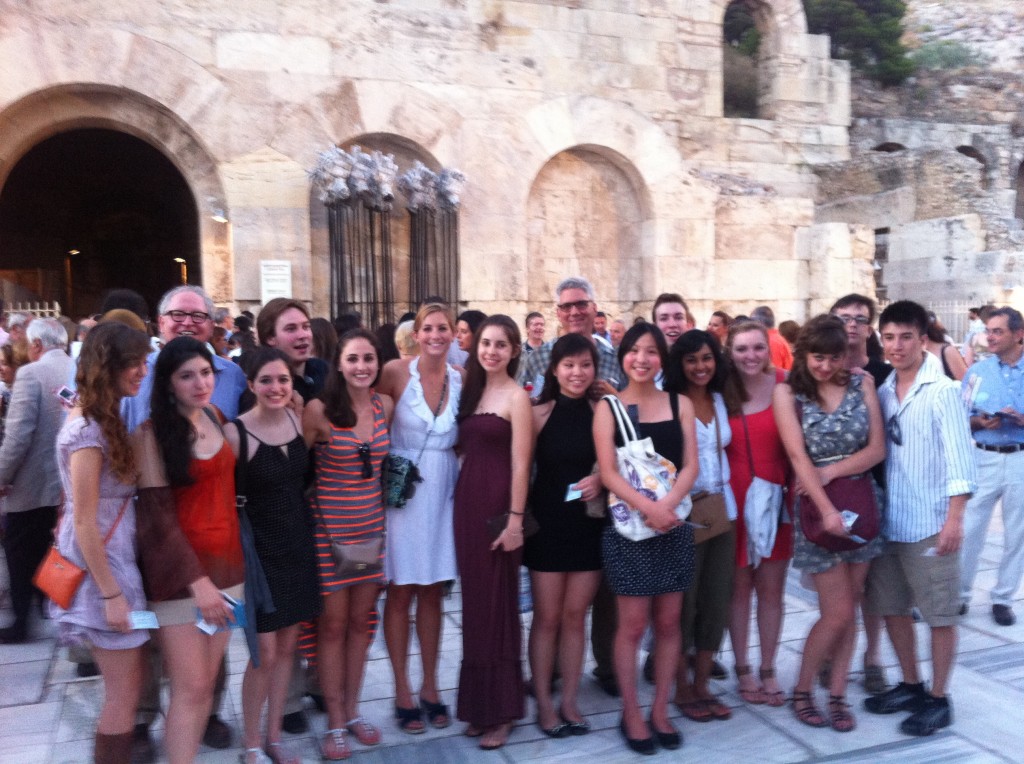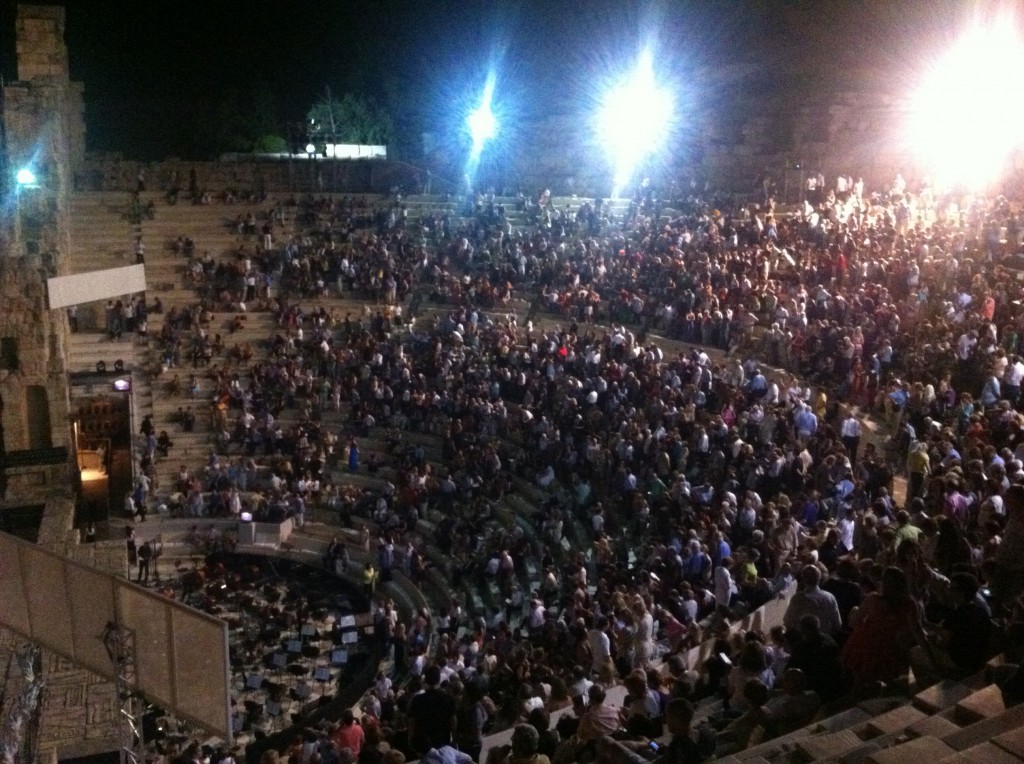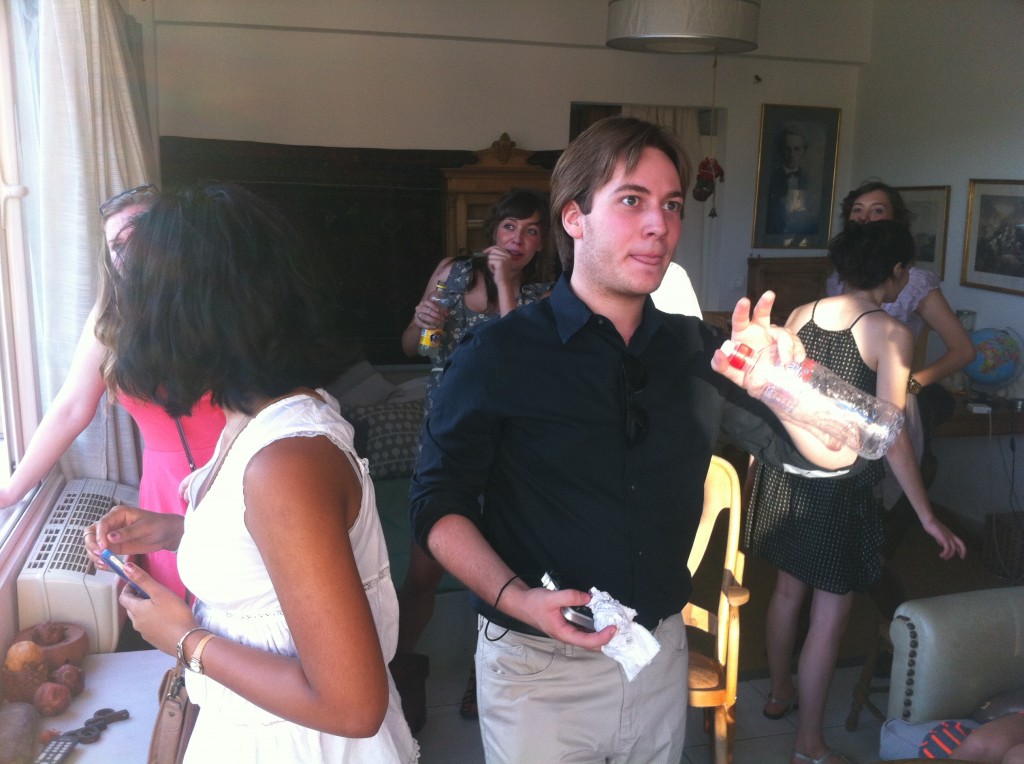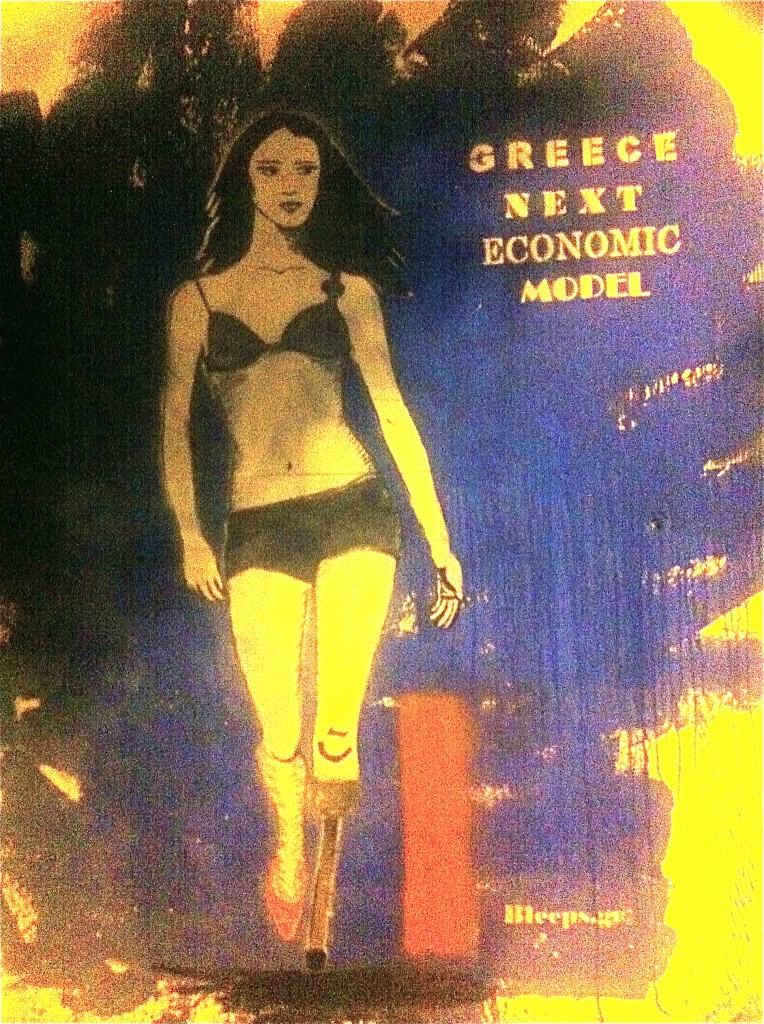As I was walking home from dinner last night, I found this written on a construction fence, along with a bunch of other political slogans in English–I wonder who the intended audience is…maybe me?
Category Archives: Uncategorized
“United We Stand, Divided We Fall 2012”
 This phrase has a variety of sources, but is most identifiable to Americans as the found words of Patrick Henry, quickly becoming a cliche tenet of Americana. It stuck out to me, first, because it was in English, but also because of the “2012.” To whom does this truism speak right now, and what does it say?
This phrase has a variety of sources, but is most identifiable to Americans as the found words of Patrick Henry, quickly becoming a cliche tenet of Americana. It stuck out to me, first, because it was in English, but also because of the “2012.” To whom does this truism speak right now, and what does it say?
I’m very interested in the vaguely intuitive sense of socialism that Greeks seem to have. Professor Vasen told us a story about how he was stuck on an island with a student once, and we asked what if there hadn’t been any hotel. He told us that one of the people in the town would have taken us in because “that’s just how they are.” I don’t think that would happen in America.
By the same token, the metro system here is weird. Payment is an honor system deal. Forgive me for being a cynic, but I’m going to bet that most people don’t pay. They claim that there are occasional checks, but I have no idea how that could ever happen. So, it seems that people have just somewhat taken this on as a free service.
As Americans, we tend to have the notion that not having is a result of not doing, and so what we have is entirely fair because it’s a result of what we do or have done. Greece seems to be nicer than that (more caring?). The idea seems to be that, if you have no job, you still need to get around. So, what is the use of closing the metro off to you? Maybe the hope is that those who can pay for it wil, and those who cannot won’t, which you can derisively call a welfare state or approvingly call humanity. That’s clearly not working out too well, with the whole massive financial crisis and everything, but whatevs.
It seems to boil down to whether the best thing for the group is for every man to be out for himself, or for everyone to look out for everyone. Greece and America seem to be at odds, with Greece, ironically, more accurately described by the statement, “United We Stand, Divided We Fall.” Sometimes I wish America were more like Greece, but, at the same time, I’m really glad we have a stable currency and everything.
We’ve started a joke that there should be a Foreign Leader Exchange Program, wherein Americans teach Greeks about accounting and organization, and Greeks come to America to tell us to chill out and take a nap from 1-3, like the rest of the Western world.
Maybe.
– Sean.
a night at the opera
that building over there with the columns might be important
Midnight Misadventures
I like to think of today as an exercise in money management. It’s our fourth day in Athens and, after so many dinners out, we collectively decided something had to give unless we wanted to single-handedly be responsible for reviving the Greek economy.
So for dinner, we all took the metro to Kabob Street (yes, this is a real thing), where we met up with Tim and got kabobs–basically meat in pita with tomatoes–for 2 euros(!!!) Then we all went back to Tim’s place for appetizers before the OPERA (Il Trovatore) which we saw in an ancient and beautiful old theater that looks exactly how you might imagine an outdoor ampitheater from Greece circa many thousands of years ago to look. Complete with ruins on top of the stage. I can’t get my camera to work, and so have no pictures, but I’m sure one will pop up here soon. It’s pretty incredible.
The Opera itself was…at the risk of sounding like a philistine…long. But I think we all took away things from it that we can apply to the plays we’re studying. Also the music was great.
Unfortunately, the ovations were twice as long as the opera. And the thing about Athens is that all the public transportation closes at midnight. Everyone seemed to know this but me and Chris, so they all took off around 11:45. Chris and I a) didn’t quite believe it could be true, and b) didn’t want to be rude and leave while people were still clapping. Consequently, we didn’t get out of there till about 12:15 at which point…you guessed it…all the public transportation was closed. We ran into Brian, who had somehow been separated from everyone else, and the three of us tried to figure out how to get home. I found a map in my purse and the hotel really didn’t look like it was more than about 15 minutes away, so, in the theme of saving euros, I made them walk. Sorry, guys.
We made it back to the hotel a little after 1 am, after crossing two black cats, three highways, and a couple dubious parks and playgrounds. We all arrived safely and soundly in one piece, but it was definitely quite an adventure.
So the moral of the story is:
-Buy kabobs for 2 euros, not salads for 8
-Believe your friends and don’t trust public transportation
-Athens is as expensive as you make it
-Maps lie
Goodnight!
Athens as grafitti museum #1
So it begins
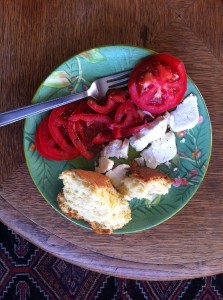 On this hot Monday morning, 14 (soon to be 15) Princeton students and two faculty gathered in Athens to begin a six week long exploration of 5th century tragedy and comedy, as scholars and as performers. We’ll be learning basic modern Greek, seeing performances at the Athens and Epidauros festivals, and most importantly learning where to find the best feta cheese. Some of us tried octopus for the first time last night. I spent the afternoon wandering the markets, looking at parts of animals I had no idea people ate and trying to pick from dozens of kinds of olives (I did pretty well, I think). The election that could well decide the future of Greece–or at least its economy–is happening on Sunday, and everything feels very quiet, like the city is holding its breath, waiting to see what will happen next.
On this hot Monday morning, 14 (soon to be 15) Princeton students and two faculty gathered in Athens to begin a six week long exploration of 5th century tragedy and comedy, as scholars and as performers. We’ll be learning basic modern Greek, seeing performances at the Athens and Epidauros festivals, and most importantly learning where to find the best feta cheese. Some of us tried octopus for the first time last night. I spent the afternoon wandering the markets, looking at parts of animals I had no idea people ate and trying to pick from dozens of kinds of olives (I did pretty well, I think). The election that could well decide the future of Greece–or at least its economy–is happening on Sunday, and everything feels very quiet, like the city is holding its breath, waiting to see what will happen next.
Over the next several weeks, the students will be taking turns updating this blog with our adventures, impressions, reactions to performances and, as is always the case in Greece, crisis or no, reveling in the unexpected. I love it here and am thrilled to be able to explore this city in depth. An Athenian for a month? There are worse fates…
Hello!
Welcome to the 2012 Global Seminar in Greece. Contact nmallina@princeton.edu for questions regarding this blog site.

